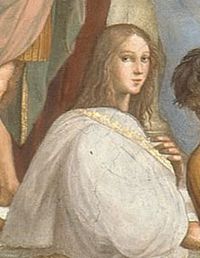
The Other Lady Philosophers
The Other Lady Philosophers
It’s Women’s History Month and I’m back with the latest installment on my favorite Lady Philosopher, Hypatia of Alexandria. This year I’m tackling Hypatia’s sister philosophers. Hypatia didn’t spring from her father’s forehead fully girded and ready for combat in the primarily male world of Late Antiquity. There is a long history of lady philosophers—”lovers of wisdom”— down through the ages, and Hypatia is just one link in that chain. More than thirty-five women are attested to in the records leading up to, and contemporary with, Hypatia—and those are just the women whose heads (and intellect) rose above the crowd enough to be noticed by the decidedly biased ancient historians. One, ARETE of Cyrene (c 400/300 BCE ) ran a school of philosophy seven hundred years before Hypatia. Nine of those women studied (what early nineteenth century scholars later called) Neoplatonism. Two (that we know of) taught both men and women.
Since thirty-five is far too many women to profile, I’ll concentrate on the Neoplatonists and leave the rest for another post. (Please go to Women-philosophers.com, maintained by Kate Lindemann Ph.D., professor emerita at Mount Saint Mary College – Newburgh, New York, for overviews on more than 110 remarkable women philosophers.) When telling the stories of women scholars in history, it is impossible to separate them from their male relatives and teachers. A little context: the vast majority of people—men and women—until recent times, were illiterate, uneducated, and labored in agriculture and resource extraction. Only a small elite could afford education and that generally was reserved for the sons.
But not always.
History is filled with fathers who educated their daughters (including Theon and Hypatia). Because of genuine affection, they had no sons, or the girls were too brilliant to ignore—it didn’t matter. It happened. (Even today, research shows that a father’s encouragement distinctly improves the chances a girl will do well, and chose a career, in the STEM fields—science, technology, engineering and math.) Because the educated elite was such a small circle, these women tended to marry inside it (if they married) and have children that followed in their footsteps. If they didn’t teach directly, they educated their children, who did teach. So let’s take a look at the Neoplatonists and the extraordinary women who contributed to this philosophy’s development and dissemination.